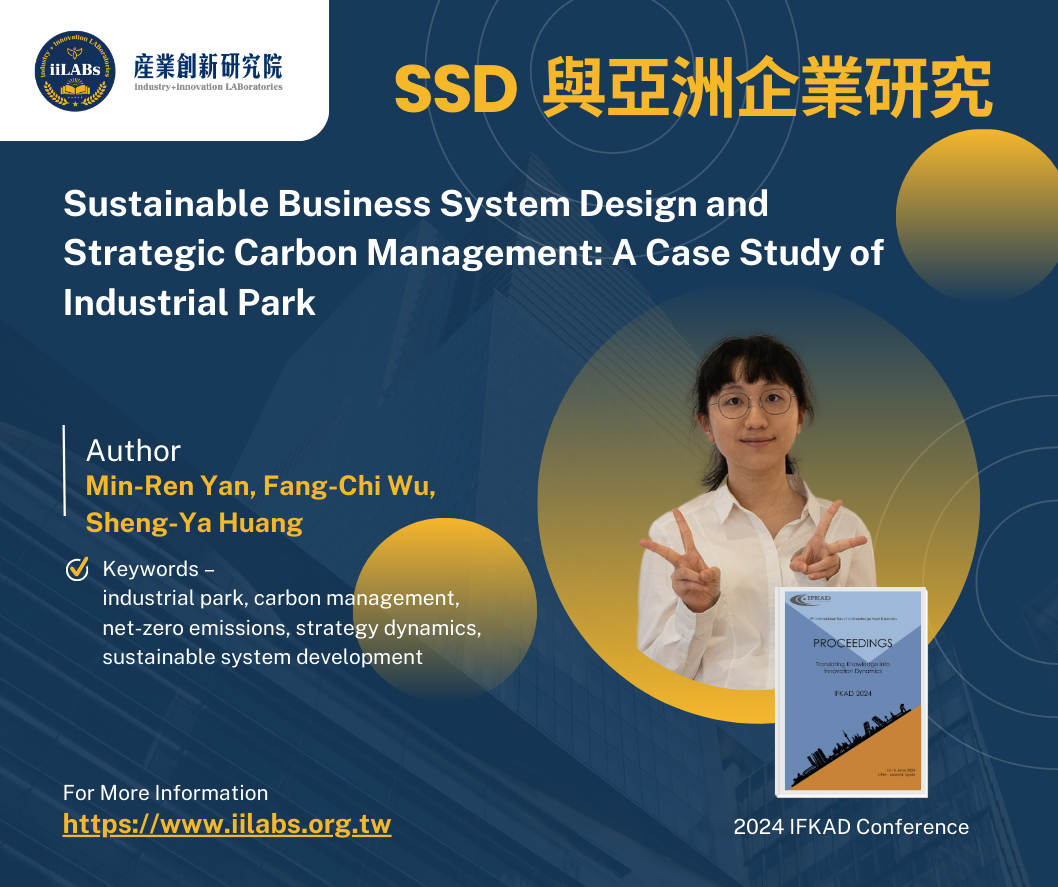


📙論文名稱:
Sustainable Business System Design and Strategic Carbon Management: A Case Study of Industrial Park
📙刊登處:2024 IFKAD國際學術研討會
📙作者姓名: Min-Ren Yan, Fang-Chi Wu, Sheng-Ya Huang
論文摘要:
The COP28 UN Climate Change Conference in Dubai contributed to accelerating climate action across various aspects by 2030. This imperative of addressing climate change has garnered global attention, constituting a paramount focal point of concern internationally. Following the path of the world, the Taiwanese government is spearheading the acceleration of industrial transformation and upgrading by establishing a novel economic model that prioritizes innovation, employment, and allocation towards sustainable development. Through the three prime strategies of connecting the future, global, and local, the government aims to stimulate industry innovation and energy. Taiwan’s Pathway to Net-Zero Emissions in 2050, announced by the Taiwan National Development Council, targets to elevate technology R&D and innovation in crucial areas, guiding the green transition of the industry to execute net-zero transition goals. The manufacturing sector emits over half of carbon dioxide in Taiwan’s total carbon emissions; thus, industrial parks must align with environmental trends and initiate carbon reduction efforts. In 2023, the Industrial Development Administration of the Ministry of Economic Affairs in Taiwan is actively supporting industrial carbon reduction for small and medium-sized enterprises (SMEs) to undergo low-carbon and intelligent transformation. Manufacturers in industrial parks are priority assistance to achieve industry transformation and upgrading. Supporting measures, for example, comprise equipment upgrades and procurement subsidies, expert guidance, talent training, enhancing operational efficiency, and improving business models. Developed in 1984, the New Taipei Industrial Park has been zoned for factories to address the pressing demand for industrial land and actively promote industrial growth. It is an industrial cluster with the largest number of SMEs in Taiwan and has an industrial value chain innovation ecosystem. A benchmarked case located in the New Taipei Industrial Park, is one of the representative Taiwanese mold manufacturers. SSD Alliance for ESG Business Transformation supported the company in verifying its 2022 Greenhouse gas inventories. By conducting a sustainable system development (SSD) framework, we help the company to build the carbon inventory model for direct GHG emissions (Scope 1) and energy indirect GHG emissions (Scope 2). Moreover, we implement carbon reduction strategies that assist us in simulating the outcomes of carbon management decisions for operations, predicting future scenarios, and understanding foreseeable outcomes. To further explore its potential, employing SSD simulations benefits businesses by anticipating their carbon emissions with lower costs and risks to achieve their net-zero goal.